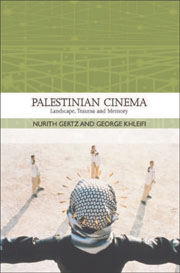Book contents
- Frontmatter
- Contents
- TRADITIONS IN WORLD CINEMA
- Dedication
- Introduction
- 1 A Chronicle of Palestinian Cinema
- 2 From Bleeding Memories to Fertile Memories
- 3 About Place and Time: The Films of Michel Khleifi
- 4 Without Place, Without Time: The Films of Rashid Masharawi
- 5 The House and its Destruction: The Films of Ali Nassar
- 6 A Dead-End: Roadblock Movies
- 7 Between Exile and Homeland: The Films of Elia Suleiman
- Conclusion
- Epilogue
- Bibliography
- Filmography
- Index
3 - About Place and Time: The Films of Michel Khleifi
Published online by Cambridge University Press: 05 August 2013
- Frontmatter
- Contents
- TRADITIONS IN WORLD CINEMA
- Dedication
- Introduction
- 1 A Chronicle of Palestinian Cinema
- 2 From Bleeding Memories to Fertile Memories
- 3 About Place and Time: The Films of Michel Khleifi
- 4 Without Place, Without Time: The Films of Rashid Masharawi
- 5 The House and its Destruction: The Films of Ali Nassar
- 6 A Dead-End: Roadblock Movies
- 7 Between Exile and Homeland: The Films of Elia Suleiman
- Conclusion
- Epilogue
- Bibliography
- Filmography
- Index
Summary
The Early Films
Michel Khleifi's early documentary films, which were created in the course of the third period, initiated a new era in Palestinian cinema. His first film, Fertile Memories (1980), crystallized and was the culmination of a process that had begun in the early 1970s and which was to be continued in later films. On the one hand, place in Khleifi's film, as in others, is an imagined place that revives the past, drawing on the pre-traumatic era and, thus functioning as a national, unity-constructing symbol that presents an idyllic home and homeland created out of an exilic state. On the other hand, the abstract space is portrayed here as a concrete, familiar, and revered place, where daily life occurs in the here and now. In Michel Khleifi's own words (private interview, Paris, 2003), “In order to defend something one must love it, and to love it, one must know it.” Furthermore, this place that preserves both past and present is meant to function in the future as a relic, as the foundation of the historical memory of what is doomed to be lost in the Israeli reality, in an ever-changing world. These films, therefore, freeze the traumatic time, replacing the existing present with the absent past. Yet, they also preserve the sequence of the actual present and of the future and of both the remembrance and the forgetfulness embedded in them.
- Type
- Chapter
- Information
- Palestinian CinemaLandscape, Trauma and Memory, pp. 74 - 100Publisher: Edinburgh University PressPrint publication year: 2008



